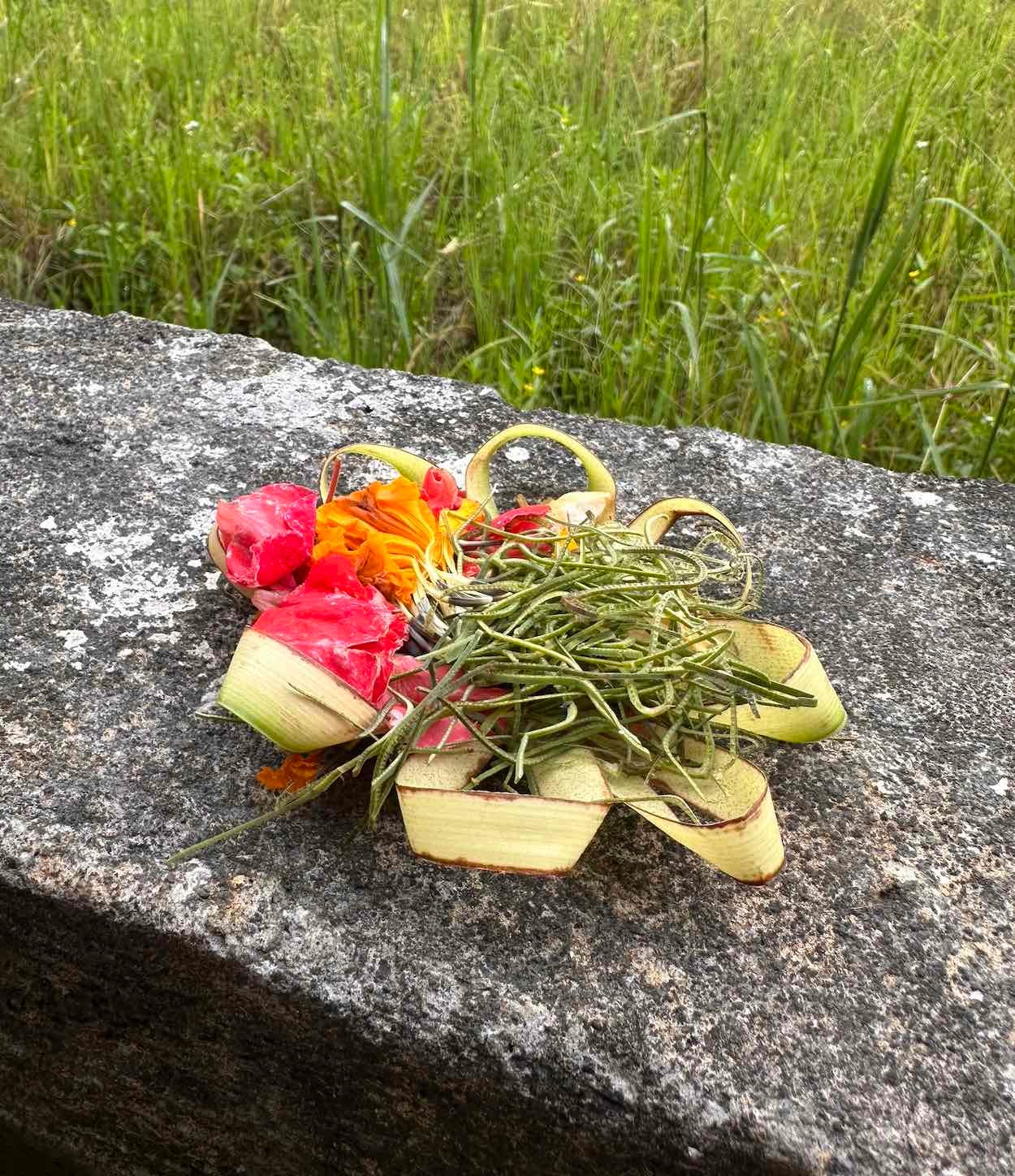- The Nomad CEO
- Posts
- 3 Life Lessons from Balinese People & Why I Bet On The New Creator Economy
3 Life Lessons from Balinese People & Why I Bet On The New Creator Economy
The Uncharted Road has led me to Colombo, Sri Lanka. Here are my weekly insights curated for you

3 lessons for personal growth from Balinese People
As you are reading this, my second 2-month stay in Bali has already come to an end. The Uncharted Road has led me to Colombo, Sri Lanka.
I am pretty sure I will discover many fascinating things about this country, but before I do, I wanted to share a few things I believe we can all learn from Balinese culture.
In the age of moral relativism, nihilism, and a lack of values and truth, it makes sense to look out for guidance in a chaotic world.
Bali is a special place. Everyone who knows the island will agree on that; there is no doubt this is true.

Rice Field and Sunset in Putulu.
Now, when it comes to why Bali is so special, we´re headed into more fuzzy territory
The thing is, we all perceive things in a different way, but I think it is also fair to say that culture makes up a big chunk of how we see the world.
It is how humans interact with the world and with each other. Culture is always unique and specific to a geographical location.
In my last few posts, I have been very clear about what I think about Gen Z. If you haven´t read it, I will just say here that it isn’t very positive.
So here are three timeless lessons I have learned in Bali that I believe the younger western generation could learn from

When an elder is present, it is considered polite to bow slightly or touch the back of their hand to their forehead as a greeting.
This gesture, known as “sungkem,” is a way of seeking blessings and showing humility.
The Balinese language also shows how much respect people have for older people. To address an elder with respect, you use a certain title, like “Pak” for men and “Ibu” for women. When showing respect for an elder, these titles are always used with their name.
People often ask elders for guidance and assistance on important issues that affect both the individual and the community. Their thoughts are very important, and the choices they make are important.
Elderly people are treated with the utmost respect in families. They are usually in charge of their own homes and make decisions about family issues and traditions. From a very young age, kids learn to respect their elders and do what they say.
Elders often play important roles within their communities, serving as leaders, mentors, and spiritual guides. Their wisdom and experience are sought after, and they are respected for their contributions to the community’s well-being.
We have far too many brainwashed young people who just finished school with pink hair and a rebellious attitude who think they are smart and want to lecture the rest of us about their particular views on things.
Wisdom comes from experience. Honor it.
Lesson II: Balinese Rituals and Self-Discipline
In Bali, it is very common to see public ceremonies held on the street. When that happens, everyone needs to stop and patiently wait for the ceremony to end.
I have had numerous encounters on my scooter where traffic stood still for over an hour.

Self-discipline is not just a way to get something done in Balinese culture; it is a sacred practice that builds spiritual growth, inner strength, and resilience. Young men learn to be self-disciplined with purpose and respect, seeing it as a way to honor their goals and themselves.
Rituals play a significant role in Balinese life, serving as a bridge between the mundane and the sacred. Young men can learn to incorporate rituals into their daily lives to enhance focus, cultivate mindfulness, and connect with their inner selves.
Structure and routine are important in Balinese culture because they help people be self-disciplined and reach their long-term goals. Teenage boys can learn to use routines and schedules that are in line with their values and goals to help them grow as people.
At first glance, to us westerners, it is almost bewildering and strange to see how much time and effort Balinese people put into certain rituals.
An example for this is called Canang sari

Canang sari are the gifts that people put in front of doors in Bali. They are small baskets made from palm leaves that are woven together and filled with flowers, incense, and other gifts.
It is a daily way to show thanks to the gods and keep the spiritual world in balance.
Usually, they are put in front of doors, temples, and other holy places.
But also in hotels, and at my hotels, I would usually get it twice a day in the morning and evening.
Lesson III: The Balinese Perspective on Work-Life Balance
You can tell the moment you arrive in Bali that the time ticks differently here.
Even though there are also quite a lot of places where it is crowded and bustling with life, mostly in tourist areas, there is still a sense of tranquility and calmness admitst all of it
Here are a few differences between Western cultures and Balinese:
Focus on Holistic Well-being: In Balinese culture, work-life balance isn’t just about managing time and commitments; it’s also about taking care of your physical, mental, spiritual, and social well-being as a whole.
Respect for Natural Rhythms: People in Bali put a lot of value on living in harmony with the rhythms of nature. They place a high value on rest, relaxation, and being close to nature because they know these are important parts of a healthy life.
Family and community as pillars: In Balinese culture, strong family and community ties are very important. These connections give people support, direction, and a sense of belonging, which is good for their overall health and work-life balance.

Elderly man working — by Roman L Binder
3 Quotes I loved this week
“A fit body, a calm mind, a house full of love. These things cannot be bought — they must be earned.”
“I’m not that clever, but I’ve got a bigger platform than people who are.
I’m just a conduit for ideas from smarter people who are way more boring.”
"Productizing yourself as the niche means integrating all aspects of yourself in a cohesive way so you can pass on to your target audience the specific and unique knowledge that you have accumulated over time and that only you can provide them with."
Why I Am Making A Bet On The Digital Creator Economy
Work has changed dramatically in the last decade. More opportunities have arisen, remote work is becoming more common, and technological advancements have begun to replace labor-intensive jobs with creative work.
There is more opportunity than ever before, but only for those who are willing to let go of their preconceived notions of what "work" entails.
You may have picked up beliefs that cause you to think:
You will require startup capital.
You must have a lot of followers and a lot of experience.
You require a physical product or service location.
You must avoid competition and saturation.
You must be obsessive about profit margins, operating costs, and supply chains.
I am telling you this because that was exactly my mindset, and boy was I wrong. I remember vividly the days when I was worrying about how to make sure I had sufficient product stock to ship from Germany to Mexico on a ship that would take 4 months until the products would get to our warehouse and then hope to get sold over the following months.
The new digital creator economy has changed all of that.
Literally, everyone can scale themselves by finding something they fall in love with and then putting in the time to learn and do research for free on the internet while sharing and documenting their work publicly as they progress.
In short, everyone can scale a personal brand.
If you are more exposed to and open to the digital economy, you may also consider:
To build an audience, you must be extremely attractive.
You must be insightful, wise, and capable of producing Jordan Peterson-level ideas.
You must be a skilled writer, speaker, and video producer and possess all of the expensive equipment that is reserved for those with money to spend.
Again, this isn’t the case
Assumptions are your worst enemy.
If you have never heard a common saying or piece of advice, you have no right to adopt it as a firm belief or assumption.
Open your mind, put it to the test, and determine for yourself whether it is true or not.
Here are a few things you need to know:
While physical products are great and can be sold directly from your brand, it is almost a no-brainer to have a digital product and service stack as your foundation.
Why?
1) They are almost free to make.
2) They can have profit margins of 90+% (on the low end if you are a one-person business).
3) They do not charge for replication. Once you know they sell, all you have to do is increase the amount of traffic directed at them.
As you gain leverage, you can reduce the amount of time you spend on client work.
What about hosting the product, scheduling calls, and establishing your "store front?"
It is also free. No-code tools have made this possible.
"No-code tools" is just a fancy way of saying "software that does the work for you." Like little salesmen who work for you 24 hours a day, seven days a week (until you are large enough to invest).
Things like:
Gumroad for eBooks, courses, and memberships
Calendly for creating a call calendar and booking link
Convertkit or Revue for email list building
Website builders for creating a personal website
Social media platforms for audience development (a traffic source similar to Facebook ads, but free if you know how to use the platform).
All of them are free, and those are just a few examples. Most of them have a cost once you reach a point where you should be making more than enough money to justify them.
Do I have to be super skilled or an expert in a specific field?
Yes, but there are workarounds. In fact, it is more advantageous to begin as a beginner.
I would like to share more of the research and work on this in my next letter, as I myself am just getting started with this.
I am going to be very honest here; I am far away from where I want to be. But this is a good thing.
I committed to sharing my progress as I am moving forward, sort of practicing in public and passing on my knowledge.
I am at the intersection of self-improvement, travel photography, and entrepreneurship, with a focus on young men, since young men are what I can relate to.
I hope you enjoyed this so far. If you think this was valuable, then please take the time to share it with a friend 🙏❤️ Thank you
Let’s grow together and see you next week!
This Weeks Phone Screensaver For You 🙏

Nung Nung Waterfall in Bali
Rate this episode please |
What topics would you like to learn more about? |
Reply